Key takeaways
- Google Gemini uses its core ranking systems — like RankBrain, BERT, and PageRank — so ongoing SEO remains essential for visibility.
- Ranking success depends on aligning with conversational, question-based search habits that reflect real user intent.
- Readable, structured content backed by E-E-A-T principles performs better in Gemini’s AI-generated answers.
- Consistently refreshed, up-to-date content signals value and helps maintain relevance in Gemini’s evolving results.
- Schema markup and online citations improve how Gemini interprets, summarizes, and credits website content.
How to rank in Google Gemini
Learn how to rank in Google Gemini now:
- Practice Ongoing SEO
- Target Conversational Phrases
- Improve Content Readability
- Demonstrate E-E-A-T
- Refresh Content Regularly
- Use Schema Markup
- Get Cited Online
1. Practice ongoing SEO
Based on hundreds of AI search engine optimization (SEO) campaigns, we’ve seen first-hand how websites practicing ongoing SEO perform better in Gemini responses than companies without an SEO program.
That’s because Google’s AI-powered experiences use some of its core ranking systems, like:
- RankBrain
- BERT
- PageRank
- Reviews
- Helpful content
- Passage ranking
Ongoing SEO and AI SEO also align when it comes to optimizations, which emphasize:
- Making content discoverable and accessible to web crawlers
- Producing authoritative content that brings unique value to a topic
- Helping crawlers understand context, like with schema markup and easy readability
Additional SEO optimizations businesses wanting to rank in Gemini should do include:
- Using HTTPS to improve site security
- Optimizing page speed to improve user experience
- Conducting outreach to build a reputable backlink profile
For more guidance on how to do SEO successfully, use our SEO Basics Guide!
2. Target conversational phrases
How people search is changing, especially when searching on an answer engine like Google Gemini. Instead of searching with phrases like “best summer destinations,” they’re searching with questions or statements like “what are some good destinations for a summer vacation.”
This shift emphasizes the need for omnichannel SEO strategies that can adapt to both traditional keyword-based searches and more conversational AI queries.
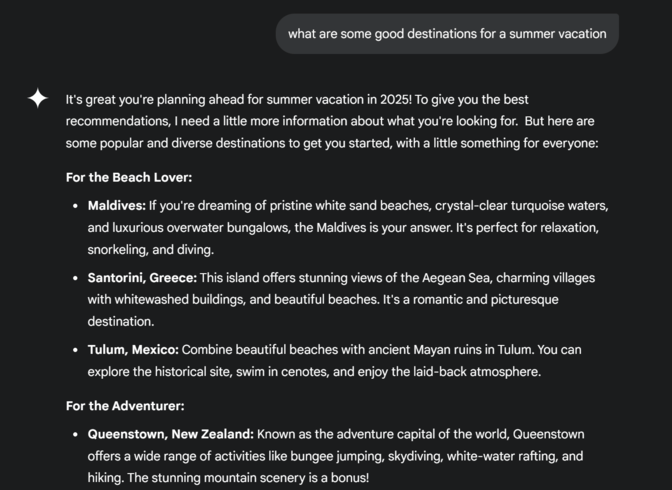
As an SEO, this shift means thinking differently about keyword research.
Instead of using a keyword research tool (none are available for answer engines), consider how a search would change when asking a friend or family member. Instead of saying, “best summer destinations,” they might say:
- We’re looking to go somewhere for the summer that’d be good for the kids
- We want to travel internationally this summer
- We’re thinking about a weekend getaway for Memorial Day weekend
All these phrases indicate different needs and intents, like wanting a kid-friendly destination or a weekend getaway during a holiday. From this research, it’s possible to create hub and spoke phrases to target (similar to SEO):
- Hub: what are some good destinations for a summer vacation
- Spoke: what are some good destinations for a family summer vacation
- Spoke: what are some good international destinations for a summer vacation
- Spoke: what are some good destinations for a Memorial Day weekend getaway
You can then target these phrases with individual pages or ultimate guides. For example, a guide on summer vacation destinations could explore some of the best options for families, international travel, or holiday travel.
Learn more about the differences between AEO vs. SEO
3. Improve content readability
Answer engines like Google, ChatGPT, Perplexity AI, and others generate responses using a user’s input, like “what are some good destinations for a family summer vacation,” their training dataset, and content from the web.
Content that’s easier to read has been proven to rank better in answer engines, including Gemini. As a user, this finding makes sense. You’re looking to get answers — not more questions — which makes readability so important.
There are several options for improving content readability, including:
- Organizing content into headings, like “Summer Destinations for Families”
- Using tables to structure information, like for comparing destination pros and cons
- Improving content readability, like by fixing run-on sentences or using simpler words
A readability tool, like WebFX’s Readability Test Tool, can help here. AI can also help. Upload or paste the content into a tool like Claude and get actionable advice on making the content easier to skim and read.
4. Demonstrate E-E-A-T
For years, Google has promoted Expertise, Experience, Authoritativeness, and Trustworthiness (E-E-A-T), so it makes sense that Google Gemini mentions and cites brands that demonstrate this concept.
There are a few strategies for building E-E-A-T, including:
- Highlight certifications, awards, or partnerships
- Share first-hand anecdotes (“My family went to XYZ for our summer vacation and…”)
- Use data points (“This area has low humidity, which makes it great for a summer vacation.”)
As a part of E-E-A-T, consider getting specific with content. Gemini — and other answer engines — thrive on providing personalized advice and often encourage users to provide more information. In the response below, for example, Gemini asks for additional details about the upcoming vacation:
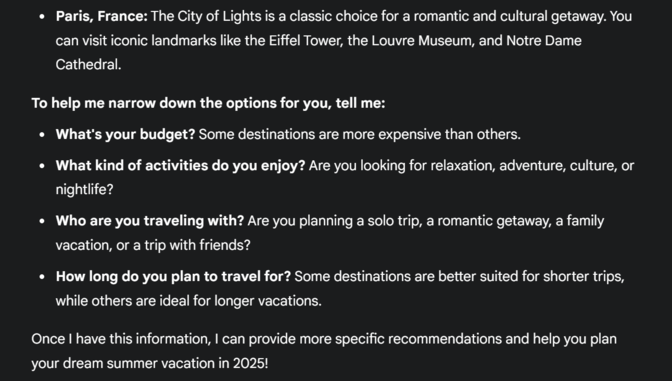
You could enhance content with this kind of information. For example:
| Destination | Price (for 3-7 days) | Best for |
| Paris, France | $$$$ | Romantic getaway |
| Santorini, Greece | $$$ | Relaxation getaway |
| Costa Rica | $$ | Adventure getaway |
You don’t have to come up with these ideas alone, either! Chatting with Google Gemini can generate ideas for demonstrating the expertise, experience, authoritativeness, and trust you bring to a topic.
5. Refresh content regularly
Refreshing content is another effective tactic for ranking in Google Gemini responses.
The goal of these refreshes is simple: Provide value! Don’t settle for changing a few words or data points (like the year 🤨). Instead, research the topic and content to determine what’s happened since it was published.
For example, a summer destination travel guide could settle for updating pricing information (see the example above). Or, it could go further — and provide more value — by highlighting changes in the destination’s offerings.
Paris, France, for example, hosted the 2024 Olympic Games. What did that mean for travelers that year? How could they purchase tickets to events, for example? Or, what could they expect when traveling and dining around the city?
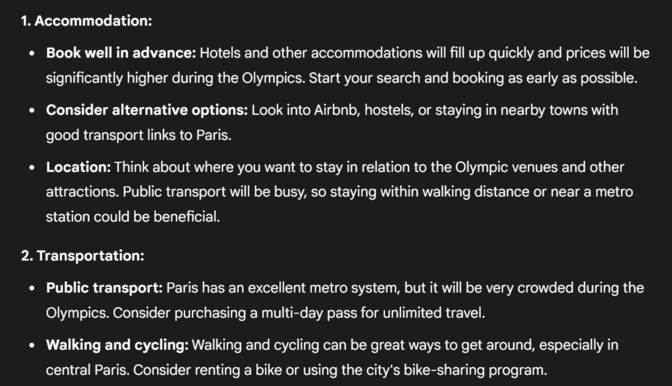
6. Use schema markup
Schema markup is another effective SEO tactic for Gemini. That’s because markup helps search and answer engines better understand a page and its content. Recipe markup, for example, can help these engines summarize:
- Necessary ingredients
- Total prep time
- Total cook time
- Nutritional information
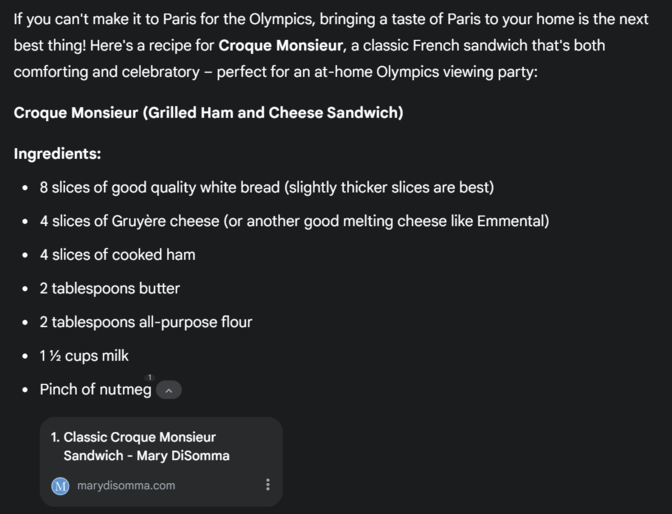
In the example above, Gemini includes a citation to Mary DiSomma. Check the URL in Google’s Rich Results Test Tool, and you’ll see the URL has Recipe markup attached — including a recipeIngredient item with the following value: Pinch of nutmeg.
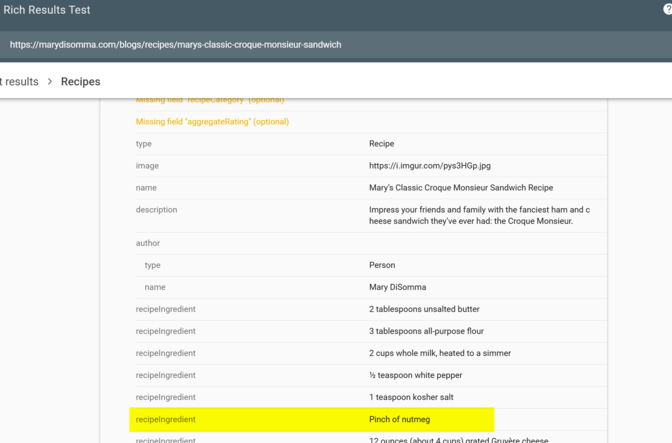
You can generate schema, from Recipe to FAQ, with a free tool like Google’s Structured Data Markup Helper.
7. Get cited online
Online citations — like the following — also correlate with better visibility in Google Gemini:
- Local listings
- Social media profiles
- Unlinked mentions
- Backlinks
- Reviews
You can improve online citations through direct action, like claiming and optimizing a local listing (like Google Business Profile), or indirect action, like producing high-quality content that brings something new to a topic, like a quiz for finding the perfect summer destination.
How to track Google Gemini rankings
When it comes to tracking Google Gemini rankings, the process is:
- Enter the targeted query in Gemini
- Review the response for brand mentions or website citations
- Log the results in a Google Sheet or Microsoft Excel document
This process isn’t ideal — or what SEOs are used to with rank tracking tools like Google Search Console. However, there are a limited number of platforms that provide rank tracking for Gemini, including OmniSEO®.
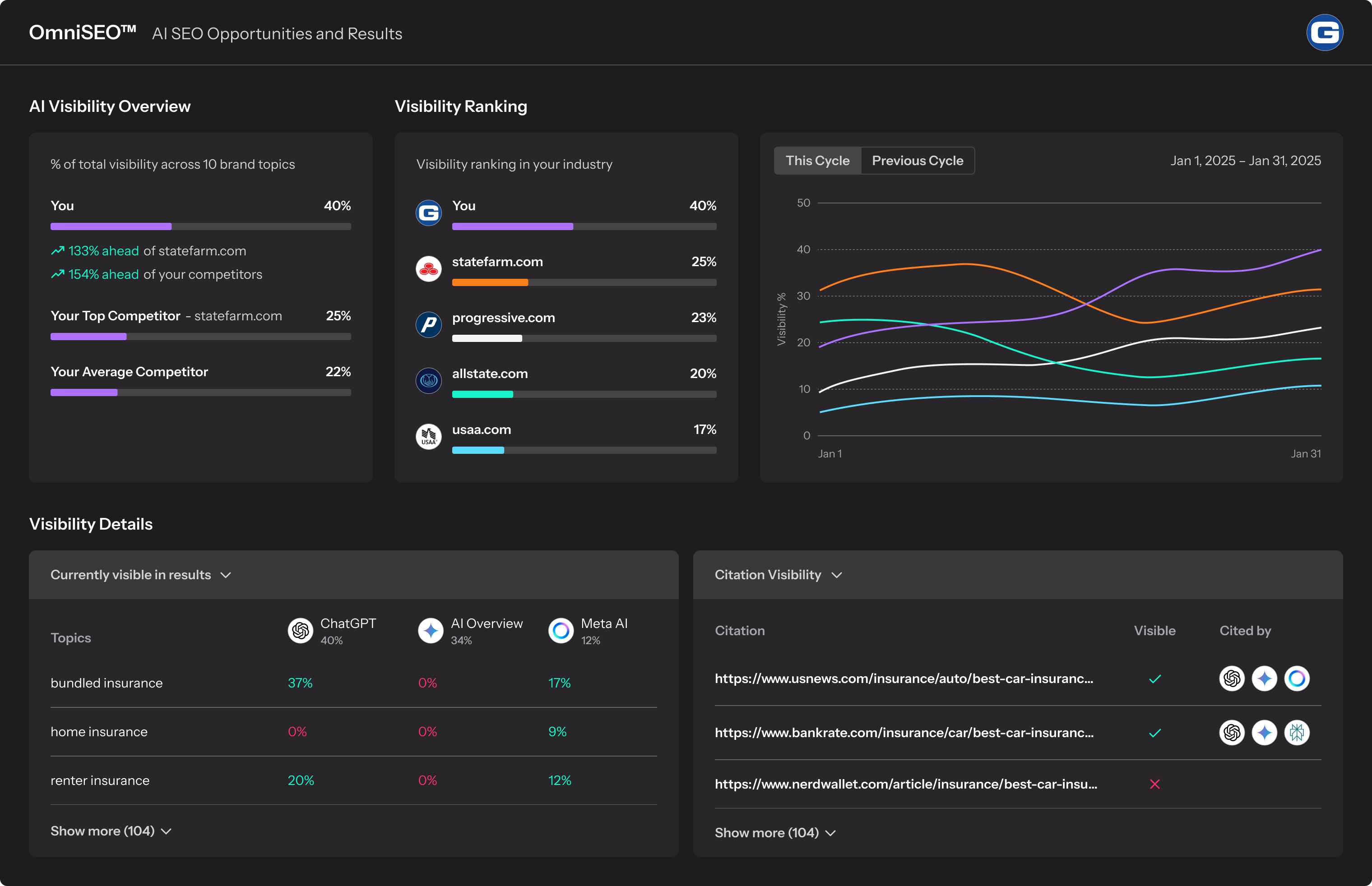
With this platform, businesses can track their rankings across answer engines, like:
- Gemini
- AI Overviews
- Microsoft Copilot
- Perplexity AI
- ChatGPT
- And more
You can even monitor competitor rankings for the same phrases.
While paid, OmniSEO® is a platform worth considering if you’re a larger organization looking to scale its visibility across answer engines.
Check if your site appears in AI Overviews
Want to check if your site appears in Google AI Overviews? Use our free AI Overview Checker to find out! Our AI Overview Checker also displays some crucial information for how organic results are informing the AI Overviews, and how your site can improve.
Get discovered in Gemini with AI SEO
Congrats! You’ve learned how to rank in Google Gemini. Now, start optimizing and start getting discovered. For professional help, consider our award-winning AI SEO services and OmniSEO® platform. Contact us online to receive your custom strategy!
FAQs
Get answers with these FAQs:
What is Google Gemini?
Google Gemini is an AI-powered answer engine accessible to Google users. Like other answer engines, Gemini will include brand mentions or website citations for text-based responses. Users can also generate images with Gemini.
What is AI SEO?
AI SEO is the process of using artificial intelligence for SEO tasks, like generating title tag ideas, or optimizing a brand’s visibility in AI-powered experiences (which is also called search everywhere optimization).
Learn how marketers are using AI in SEO in 2026, check out insights from the latest AI SEO statistics.
Is optimizing for Google Gemini worth it?
Even though Gemini has fewer users than Meta AI and ChatGPT, it’s still the third most popular answer engine with 140 million users. Not to mention, Google has 10 billion monthly workspace users and an expected $75 billion investment in AI, which makes optimizing for Gemini wise.
How long does it take to rank in Google Gemini?
Ranking in Google Gemini can take a matter of weeks or months. The answer depends on several factors, including the website’s existing SEO, the targeted phrase, and the other websites competing for that answer.

Table of Contents
- How to Rank in Google Gemini
- 1. Practice Ongoing SEO
- 2. Target Conversational Phrases
- 3. Improve Content Readability
- 4. Demonstrate E-E-A-T
- 5. Refresh Content Regularly
- 6. Use Schema Markup
- 7. Get Cited Online
- How to Track Google Gemini Rankings
- Check if Your Site Appears in AI Overviews
- Get Discovered in Gemini with AI SEO
- FAQs
- Free Guide: How to Get Your Business to Show in Generative AI Tools

Future-Proof Your SEO Strategy with OmniSEO®
Goodbye search engine optimization, hello search everywhere optimization.
Writers

Related Resources
- Do I Need GEO? Yes, if You Want to Stay Agile in 2026 and Beyond
- GEO vs. SEO: Key Differences and Importance in Digital Marketing
- Google Ads + AI Overviews: Everything You Need to Know
- Google AI Mode: What SEOs Need to Know (And Do) Before 2026
- How AI is Fundamentally Reshaping Search & Discovery
- How AI Search is Changing User Search Behavior (and What It Means for You)
- How Do I Get My Products to Be Recommended in ChatGPT? A Guide to Instant Checkout
- How to Appear in ChatGPT Answers: a Guide for Businesses
- How to Do ChatGPT SEO (And How to Use It for SEO)
- Meet SEO’s New Era: Search Everywhere Optimization



